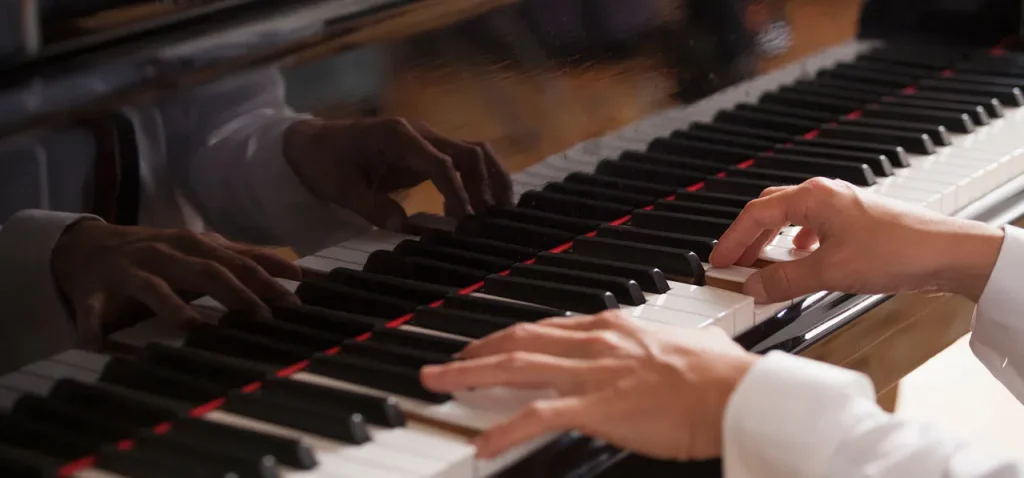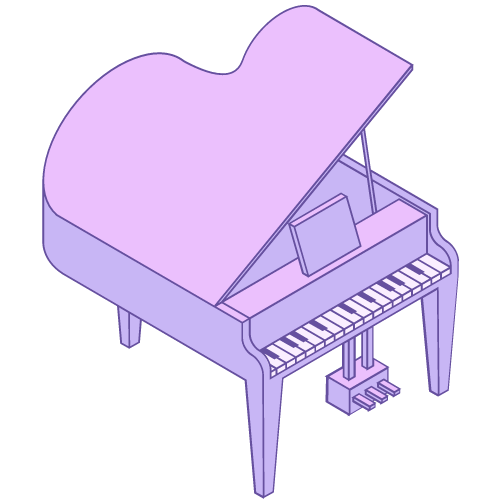Blog
Common Piano Repairs and How to Prevent Them
Pianos are intricate instruments made up of thousands of individual parts, and like any mechanical system, they require regular maintenance and occasional repairs. Whether you own a grand piano, upright piano, or a digital keyboard, knowing the most common piano repairs and how to prevent them can help you extend the life of your instrument, avoid costly repairs, and keep it sounding its best.
In this guide, we’ll explore the most common piano repairs, the reasons they happen, and how to prevent them from occurring in the first place.
1. Tuning Issues
Problem:
One of the most common issues piano owners face is that their piano goes out of tune. A piano’s strings are under immense tension, and fluctuations in temperature and humidity, or even regular playing, can cause them to lose their pitch over time.

Prevention:
- Regular Tuning: Schedule regular tunings, ideally at least once a year. More frequent tunings may be necessary if your piano is exposed to drastic changes in temperature or humidity, or if it is played heavily.
- Maintain Stable Temperature and Humidity: Keep your piano in a room with a stable temperature (between 68°F – 72°F) and humidity levels (40%-60%). Use a humidifier or dehumidifier as necessary to avoid significant fluctuations in the air around the piano.
2. Broken or Sticking Keys
Problem:
A key may become stuck or unresponsive, making it difficult to play or producing no sound when pressed. This can happen due to a variety of reasons, including dust or debris inside the piano, worn-out parts, or issues with the action mechanism.
Prevention:
- Regular Cleaning: Dust and debris can accumulate under the keys, leading to sticking or sluggishness. Regularly clean the keys and the surrounding area with a soft cloth and gentle cleaning products.
- Avoid Moisture: Moisture can cause parts of the action or keyboard to swell, leading to sticky or unresponsive keys. Keep your piano in a dry, well-ventilated area to prevent moisture buildup.
- Proper Usage: Make sure that no objects or debris fall into the piano or onto the keys, especially if you have young children or pets.
3. Action and Pedal Problems
Problem:
The action is the mechanism that connects the keys to the hammers, and over time, it can become worn or misaligned. Similarly, pedal issues such as sticky pedals or pedals that do not respond properly are common. Problems with the action or pedals can affect the performance and playability of your piano.
Prevention:
- Regular Maintenance: Have a professional technician regulate your piano’s action and pedals every few years. This will ensure that all moving parts are functioning smoothly.
- Avoid Excessive Force: Playing the piano with excessive force or improperly using the pedals can strain the action and pedals over time. Be mindful of how you use the pedals to ensure their longevity.
- Environmental Control: Extreme fluctuations in temperature or humidity can affect the action mechanism. Keep your piano in a stable environment to minimize stress on the action and pedal components.
4. Broken Strings
Problem:
A piano string may break due to excessive tension, wear, or physical damage. A broken string is a common issue in pianos that are frequently played or that have not been tuned for a long time.
Prevention:
- Regular Tuning: Have your piano tuned regularly to keep the tension of the strings at optimal levels. A string that is overly tight due to a lack of tuning is more likely to break.
- Proper Handling: Avoid touching the strings or hammers, as physical pressure on the strings can cause them to snap.
- Quality Control: High-quality pianos tend to have stronger, longer-lasting strings. If your piano is older or you notice a significant number of broken strings, it may be time to consider replacing them or upgrading to a newer instrument.
5. Cracked or Warped Wood
Problem:
Wooden parts of the piano, particularly in the case and soundboard, are susceptible to warping, cracking, or shrinking due to changes in temperature and humidity. This can affect the piano’s tone and overall performance.
Prevention:
- Maintain Stable Conditions: The most effective way to prevent wood damage is by maintaining a stable temperature and humidity in the room where the piano is kept. Avoid placing the piano near heating vents, air conditioners, or windows where the temperature fluctuates.
- Avoid Direct Sunlight: Prolonged exposure to direct sunlight can cause the wood to dry out and crack. Position the piano away from windows or install curtains or blinds to protect it from the sun’s rays.
- Use a Humidifier/Dehumidifier: In areas with very dry or humid climates, use a humidifier or dehumidifier to maintain the piano’s internal environment. A piano humidification system can help regulate moisture levels inside the instrument.
6. Rusted or Corroded Parts
Problem:
Over time, the metal components of the piano, especially the strings and some action parts, can rust or corrode, especially if the piano is exposed to excessive moisture or humidity.
Prevention:
- Environmental Control: To prevent rusting or corrosion, keep your piano in a room with controlled humidity. Moisture in the air can cause metal parts to rust over time.
- Regular Cleaning and Inspection: Have a professional technician inspect the metal components periodically for signs of rust or corrosion and clean them as needed.
- Piano Cover: When not in use, cover your piano with a breathable cover to prevent dust and moisture from coming into contact with the metal components.
7. Problems with the Piano Pedals
Problem:
A common issue with piano pedals is that they may become stuck, squeaky, or non-responsive over time. This may be due to mechanical wear, dirt, or the need for adjustment.

Prevention:
- Regular Pedal Use: Make sure to use the pedals properly and regularly. Pedals that are used sporadically may become stiff or unresponsive.
- Cleanliness: Keep the pedal area clean by wiping it down periodically with a soft, dry cloth. Avoid letting dirt or debris accumulate, as this can cause mechanical issues.
- Professional Regulation: If you notice any issues with the pedals, have a professional technician regulate the pedals to restore their functionality.
8. Lost or Misaligned Action Regulation
Problem:
The action of the piano (which includes the mechanism that connects the keys to the hammers) may become misaligned or lose its regulation over time. This results in uneven playing feel, missed notes, or mechanical malfunctions.
Prevention:
- Professional Regulation: Have the action professionally regulated every few years to maintain smooth, responsive playing. This is essential for ensuring a high-quality playing experience.
- Avoid Extreme Temperature and Humidity Changes: Sudden shifts in temperature and humidity can lead to warping and misalignment of action parts, so maintain a stable environment to prevent these issues.
9. Problems with the Pedal System
Problem:
The pedal system can suffer from issues like loose pedals, squeaky pedals, or worn-out pedal parts. These issues may interfere with your ability to control the sound and sustain of your piano.
Prevention:
- Regular Use: Use the pedals regularly to ensure they remain responsive. A pedal that’s rarely used can become stiff and unresponsive over time.
- Avoid Force: Avoid using excessive force on the pedals, as this can cause damage over time. Be gentle when engaging and disengaging the pedals.
- Maintenance: Periodically check the pedal system for signs of wear or damage, and have a technician make adjustments or repairs as needed.
Conclusion
Owning a piano is a long-term commitment that requires attention and care. While common piano repairs like tuning issues, broken strings, or action problems are inevitable over time, regular maintenance and proper care can help minimize the need for repairs and prolong the life of your instrument. By maintaining a stable environment, scheduling regular tunings, and taking proactive steps to protect the piano from damage, you can keep your instrument in optimal condition for years to come.
If any issues arise, it’s always best to consult a professional piano technician to ensure the repairs are handled properly. Regularly maintaining your piano will help you avoid major problems and enjoy the beautiful sound of your piano for many years.


